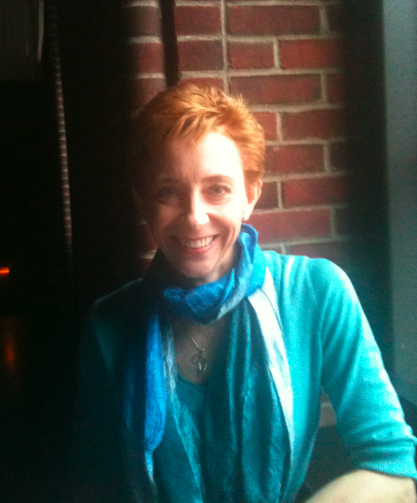So, this week I get “wordless” with Martha Beck
You know that conversation starter where someone asks, “So who would you most like to sit next to on a plane”? For some deeply intuitive and not wholly understood reason my hypothetical answer (because, in fact, no one has ever actually launched a conversation with me in this way) is Martha Beck. Martha is one of Oprah’s advisers and cited as “the best-known life coach in America”. The only magazine I’ve ever subscribed to is Oprah’s O Magazine, and mostly for Martha’s tack-sharp, “and-now-sweetheart-it’s-time-to-get-over-yourself” advice column. Let’s just say, she speaks to me.
So in New York , while I didn’t sit next to Martha on a plane, I do share a green tea with her at the swish Hudson Hotel…and watch on as she defiles the restaurant’s cutlery.
Now for the bit that needs to be accented in fluorescent marker with big red circles around it. Shortly after we sit down and make high-energy small talk, Martha bends a spoon using the stillness of her mind (and her hands, lightly). A few things you should know: she first gets me to try bending the spoon (there was no way I can budge it, and, let me tell you, I have “man hands”); Martha weighs little more than a whippet with the corporeal strength to match; the act is un-premeditated, using a spoon from the restaurant (not her own); and, finally, if you’ve seen The Matrix, yes, it’s rather like that.
Martha (that’s her below) shuts her eyes for 10 seconds and then, using two hands but no visible brute strength, calmly bends the spoon 45 degrees. I grab it from her; surely I can bend it now the metal has “loosened”. But, nope, it still doesn’t yield. When we’re done, she shuts her eyes again and bends the spoon back into shape. It’s not something to believe or not believe. It just happens. As Martha says, we can’t see thoughts, or “prove” thoughts, but that doesn’t mean they don’t exist.
So how did she do it? She used wordlessness, she says. For her tenth book, Martha, a Harvard graduate, New York Times bestselling author and former Mormon who’s survived untold hardships (including having her husband come out as gay; she then realised she was gay shortly after), is travelling the world studying shaman and wise leaders, to find the secret to living our best life (to adopt an Oprah-ism). The most powerful technique these leaders have in common, she says, is… wordlessness. Which is a state of being involving stilling the mind and going beyond concepts and language. In some cultures this takes the form of meditation, others trance. Beyond words, nothing is delineated. Everything is connected and we’re not limited by mental constructs, such as “us” and “them”, and “hard, metal spoons can’t be bent”.
Granted, the spoon-bending stuff is tough to absorb on a Sunday morning. And I don’t have the space – or expertise – to spell out how Quantum physics can now explain this kind of energetic phenomena. I suggest you watch the cult film What the Bleep Do We Know, or The Matrix for this. Also, Jill Bolte-Taylor on TED.com talks about her experience of having a stroke, and the insights it provided her into our experience of “matter”. It gives slightly different take on the same kind of thing and is my FAVOURITE TED.com presentation.
That all said, the benefits of wordlessness is indisputable. By now many of us have heard of those experiments done on Tibetan monks which show meditation enlarges the “happiness” bits of the brain. Martha has done weight-loss experiments where subjects using calming, or wordless, techniques alone lose 11pounds more (in one day) than those using traditional diets.
Achieving wordlessness is another matter. Martha suggests I try this technique: go through each of the five senses and recall your favourite moment for each. For me: the smell of cheese on toast, the visual of a particular camping spot in Kakadu at dusk, the sound of kookaburras, the taste of dark chocolate, the feeling of being stroked on the inside of my arm. Then conjure them up, at all at once, flood yourself in a bubble ‘n’squeak of outrageously pleasant stimuli.
I do this and hold the riotous sensation as long as I can. My mind is so flooded with feeling there’s no room for thoughts or words. Feelings “crowd out” word-thoughts, and I feel a lightness and focus seep over me like honey.
These sensations aren’t new to me. I’ve been meditating daily for several years. Yet I struggle to still my mind. In my meditation group I often vocalise that I’m crap at mediation. But holding a wordless space renders such outbursts redundant. It might not bend spoons, but it is smoothly powerful.
I’d love to know how meditation “feels” for you. I often feel a “suction” feeling when I slip into the space. When the words go, I feel sucked into nothingness and it feels wonderful… you?



